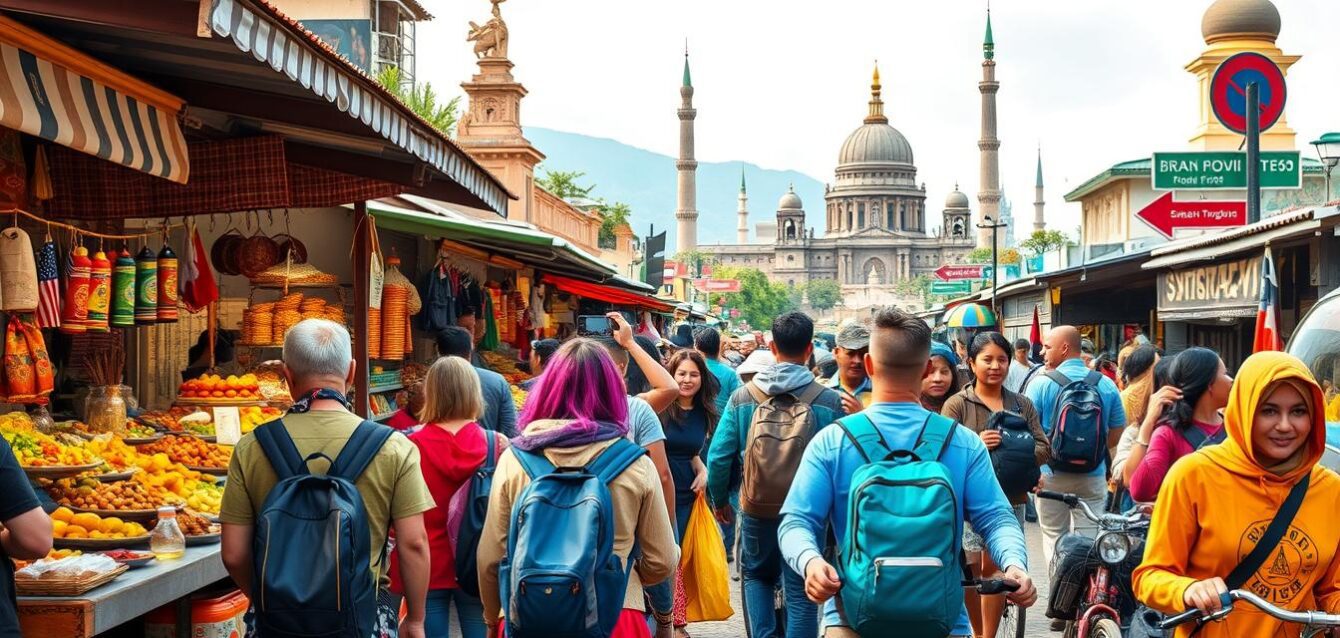Did you know the average American spends over $6,000 on international travel each year? This huge amount can seem like a big hurdle to exploring the world. But, with the right strategies, you can travel the globe for much less.
In this guide, we’ll share money-saving secrets used by savvy travelers. You’ll learn how to find affordable places to stay and enjoy local experiences. These tips will help you travel the world without breaking the bank.
Key Takeaways
- Discover budget-friendly accommodation options beyond traditional hotels
- Learn how to utilize local transportation and avoid expensive taxis or rental cars
- Explore free and low-cost activities to immerse yourself in a destination’s culture
- Embrace a local lifestyle by grocery shopping and dining at authentic eateries
- Maximize your travel budget through loyalty programs and strategic planning
Strategize Your Accommodation Options
Planning your budget-friendly travels means getting creative with where you stay. Hotels can be pricey, but there are cheaper alternatives. Let’s look at some options.
Budget-Friendly Hotel Alternatives
Hostels are a cost-effective choice, offering basic but comfy stays. They often have shared spaces like kitchens and lounges. This can help you save on food costs.
Another option is Airbnb. Here, you can find cozy apartments or private rooms for less than hotels. It’s a great way to save money.
Couchsurfing and Hospitality Exchanges
For the bold traveler, couchsurfing and hospitality exchanges offer a unique cultural dive. These platforms connect you with locals who might offer free or cheap stays. It’s a win-win, saving you cash and giving you local insights.
“Couchsurfing is an incredible way to travel on a budget and meet amazing people along the way. I’ve saved thousands of dollars and had some of my most memorable experiences by staying with local hosts.”
Exploring different accommodation options can stretch your travel budget. Whether it’s hostels, vacation rentals, or hospitality exchanges, pick what suits your travel style and budget best.
Embrace Local Transportation
Exploring a new place on a budget? Local transportation is key. Forget taxis or rental cars, which can empty your wallet fast. Try buses, trains, and subways instead. They’re cheaper and let you see the place like a local.
Learning the local transit system is smart. Cities have buses, trains, and subways to get you around. For instance, in New York City, a subway ride is $2.75. A 7-day pass is $33. That’s a big savings over taxis or ride-sharing.
| City | Local Transportation Cost | Savings Compared to Taxis |
|---|---|---|
| New York City | $2.75 per subway ride, $33 for 7-day pass | Up to 80% savings |
| Paris | €1.90 per metro ride, €14.90 for 10-ride pass | Up to 70% savings |
| Tokyo | ¥170 per subway ride, ¥1,500 for 1-day pass | Up to 75% savings |
Also, many places have bike-sharing or scooter rentals. These are cheap and green ways to see the area. They’re much cheaper than renting a car or using ride-hailing.
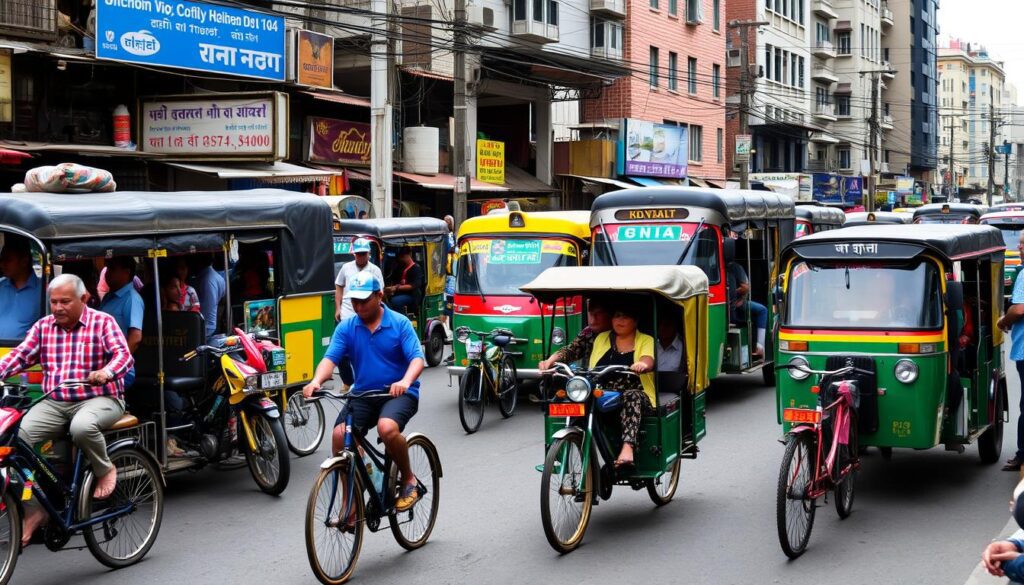
Using local transport saves money and lets you dive into the local vibe. Say goodbye to taxis and hello to public transit. Your wallet will appreciate it!
Seek Out Free and Low-Cost Activities
Traveling on a tight budget doesn’t mean missing out on fun. There are many free and low-cost activities that offer cultural experiences and entertainment. You can explore local parks, attend free cultural events, and enjoy festivals without spending a lot.
Explore Local Parks and Public Spaces
Many cities have beautiful parks and public spaces that are free to visit. These places offer a peaceful break from the city’s noise. You can take a walk, have a picnic, or just watch people go by.
Attend Free Cultural Events and Festivals
- Look for free cultural events, like music, art, and festivals, on local websites.
- These events let you dive into the local culture without spending money.
- Free outdoor concerts, dance shows, and art installations are common in many cities.
Choosing free and low-cost activities helps you travel further on your budget. You can enjoy the outdoors or explore local arts and culture without spending a lot. There are many ways to discover a place without breaking the bank.
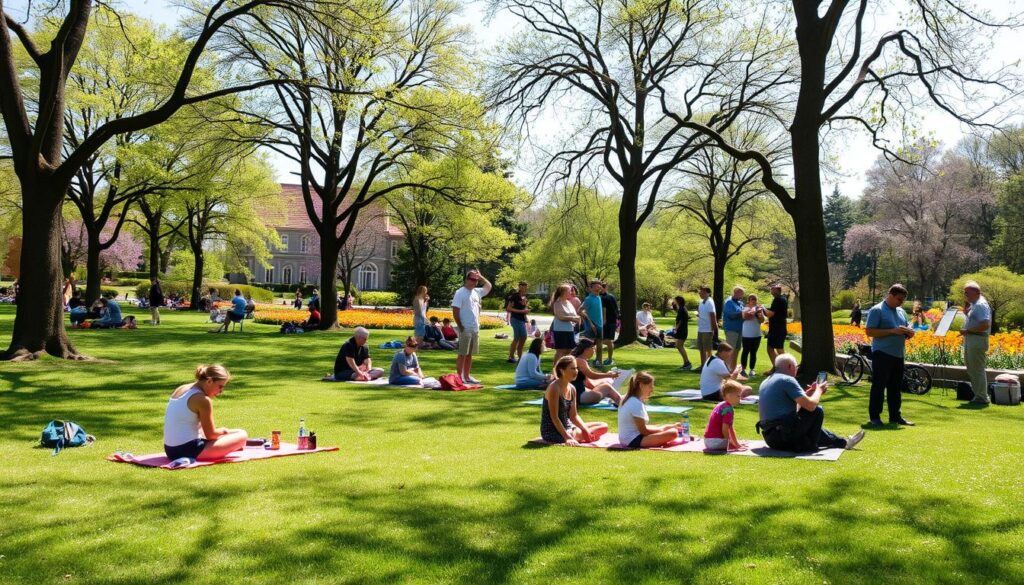
Eat Like a Local
Trying local food is a fun way to dive into a place’s culture and save money. Visit local markets, grocery stores, and street food stalls. You’ll find great deals and get a real taste of the area.
Grocery Shopping and Self-Catering
Shopping for groceries and cooking your own meals is a smart money move. Look for local markets and supermarkets for fresh, affordable ingredients. You can make tasty, cheap meals in your place. It’s a chance to try new dishes and save cash.
Street Food and Local Eateries
Street food and local spots are perfect for budget dining. They offer a peek into the local culture and tasty food at low prices. From food carts to family restaurants, exploring these places is an adventure. It’s a great way to dive into the area’s food traditions.
| Dish | Average Cost in USD |
|---|---|
| Pad Thai (Bangkok, Thailand) | $1.50 – $3.00 |
| Tacos al Pastor (Mexico City, Mexico) | $0.75 – $1.50 |
| Falafel Sandwich (Cairo, Egypt) | $0.50 – $2.00 |
The table shows how affordable local food can be. Street food and local eateries offer delicious dishes at low prices. By trying local food, you can enjoy a rich culinary experience while staying within your budget.
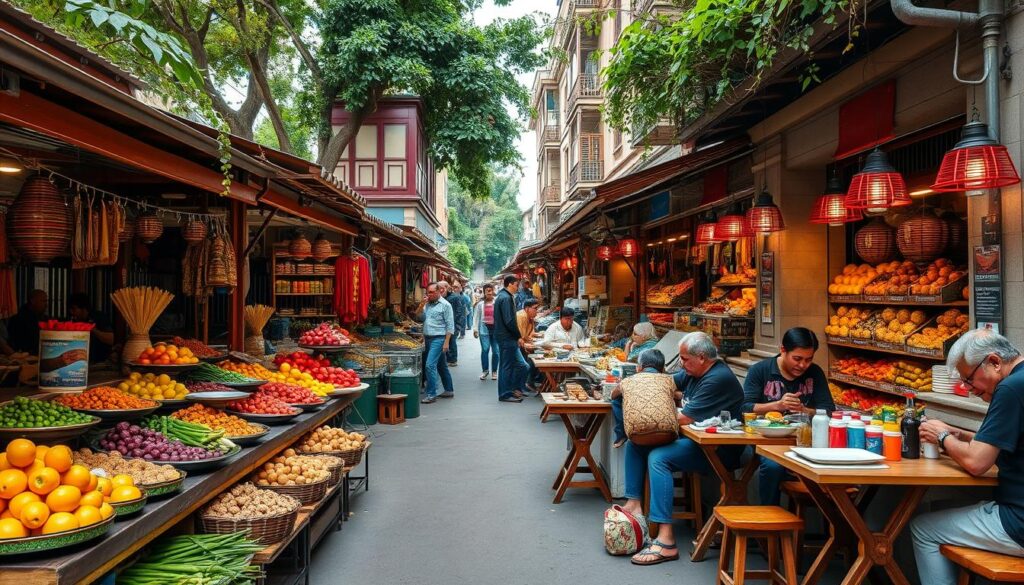
“The best way to find yourself is to lose yourself in the service of others.” – Mahatma Gandhi
Maximize Your Travel Budget
Traveling the world on a tight budget is possible. With smart strategies, you can explore the globe without spending too much. Here are some tips to stretch your travel funds:
Set a Realistic Budget
First, make a detailed budget for all your expenses. This includes transportation, accommodation, food, and activities. Be honest about how much you can spend and save for surprises. This keeps you on track and prevents overspending.
Track Your Spending
Watch your spending closely while traveling. Use a budgeting app or a simple spreadsheet to track your expenses. Regularly check your spending to find ways to save and adjust your budget as needed.
Be Flexible with Dates and Destinations
Being flexible with your travel plans can save you money. Look for deals by traveling during off-peak seasons. Also, consider visiting less popular places that offer great experiences at lower costs.
| Expense | Average Cost | Budget-Friendly Alternative |
|---|---|---|
| Airfare | $500 – $800 | $300 – $500 (by traveling during off-peak seasons) |
| Accommodation | $100 – $200 per night | $50 – $100 per night (by staying in hostels, Airbnb, or couchsurfing) |
| Food | $30 – $50 per day | $15 – $25 per day (by cooking your own meals and eating at local eateries) |
| Activities | $50 – $100 per day | $20 – $50 per day (by exploring free local attractions and outdoor spaces) |
By using these strategies, you can travel the world on a tight budget. Enjoy your adventure without spending too much.
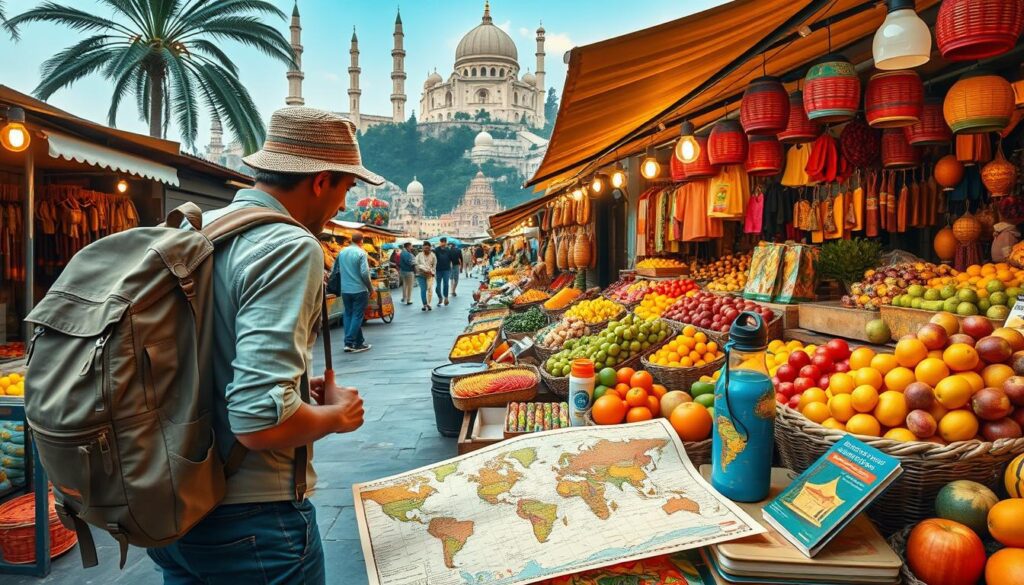
Leverage Travel Rewards and Discounts
As a smart traveler, it’s key to use travel rewards and discounts. These can help you save money on your trips. Whether you fly often or stay in hotels, these benefits can cut down your costs.
Airline and Hotel Loyalty Programs
Joining airline and hotel loyalty programs can save you a lot. Big airlines and hotels give out points, miles, and special status to loyal customers. By always choosing your favorite airlines and hotels, you can get free flights, better rooms, and more.
For instance, American Airlines’ AAdvantage program lets you earn miles for every dollar spent. You can use these miles for free flights or other rewards. Hilton Honors also lets you earn and use points for hotel stays and get special rates and discounts.
Student, Senior, and Other Special Discounts
- Students can get discounts on flights, hotels, and attractions with a student ID. Many museums and tour companies offer lower prices for students.
- Seniors, 65 and up, can find travel discounts like cheaper airline tickets and hotel rates. There are also special deals for seniors.
- Families, military, and some professional groups can get travel discounts too. Always check for special offers that can save you money.
Using these travel rewards and discounts can make your trips cheaper. You can see the world without spending too much.
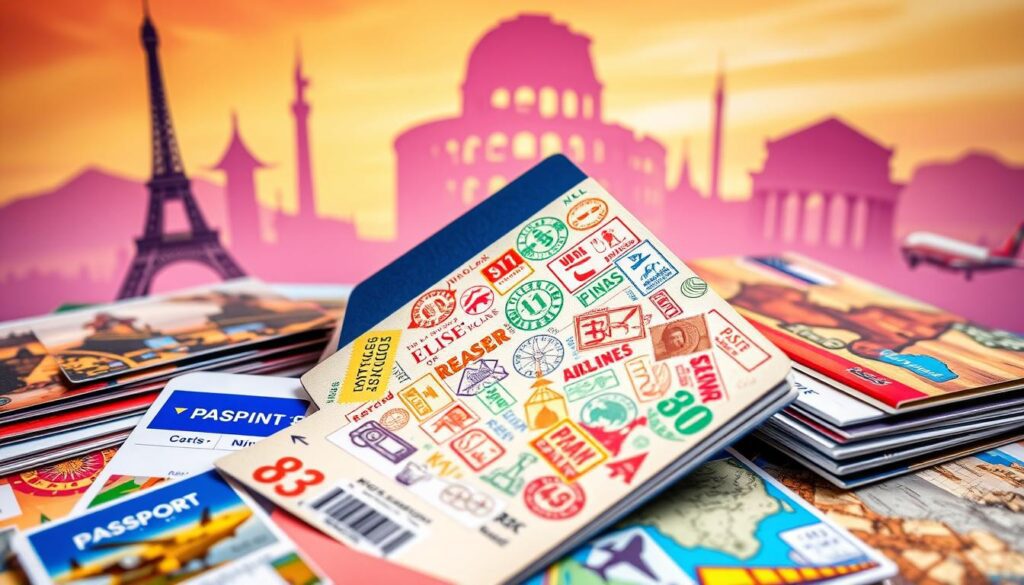
Plan Your Itinerary Strategically
Creating a detailed itinerary is key to saving money while traveling. Traveling during the off-season or shoulder season can help a lot. These times are less busy, which means lower prices on flights, hotels, and activities.
Off-Season and Shoulder Season Travel
Traveling in the off-season, like winter in Europe, can cut costs by up to 50%. Places like Paris or Rome are cheaper then. The shoulder season, just before or after the peak, also offers good deals.
- Off-season travel: Explore destinations during the “low season” when crowds are smaller and prices are lower.
- Shoulder season travel: Take advantage of the periods just before and after peak season for more affordable rates.
- Be flexible with your travel dates: Adjust your schedule to align with the most cost-effective times to visit your desired destinations.
By planning your itinerary wisely, you can save money. You’ll also see places in a more real way, without the crowds.
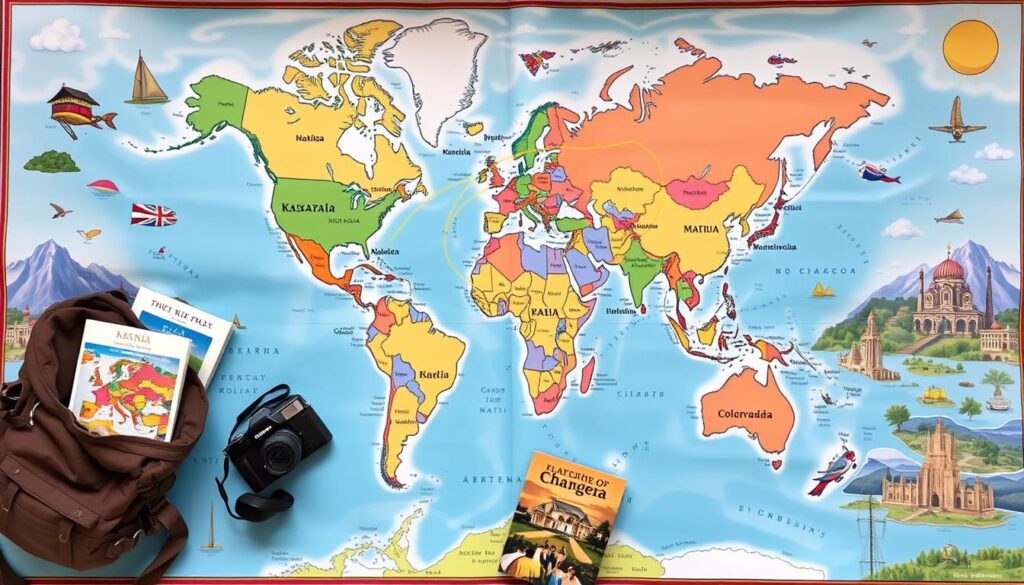
“Savvy travelers know that the off-season and shoulder season can be the key to unlocking incredible deals and a more immersive experience.”
Pack Light and Travel Smart
Packing light and traveling smart are key for those watching their budget. By not overpacking and focusing on the essentials, you can save money on baggage fees. This makes your trip smoother and less stressful. When packing light, choose items that can be used in many ways. This way, you can create different outfits with just a few pieces.
To travel smart, invest in good, long-lasting travel gear. A sturdy backpack or suitcase and a smart packing system can greatly improve your trip. Also, check the weather and cultural norms of your destination. This helps you pack right, avoiding unnecessary items that add weight.
- Limit your luggage to a carry-on-sized backpack or suitcase
- Choose versatile, lightweight clothing that can be mixed and matched
- Invest in space-saving packing cubes and compression bags
- Opt for quick-drying, wrinkle-resistant fabrics
- Pack only the essentials, such as a few pairs of socks and underwear, and one or two versatile outfits
| Packing Tip | Benefit |
|---|---|
| Limit your luggage to a carry-on | Avoid baggage fees (up to $50 per bag for checked luggage) |
| Choose multi-purpose clothing | Reduce the number of items you need to pack |
| Use packing cubes and compression bags | Maximize space in your luggage and keep items organized |
By following the packing light and traveling smart approach, you can avoid the hassle of too much luggage. This lets you enjoy exploring more, save money, and dive deeper into local experiences.
“The light packer’s motto: ‘Less is more.'”
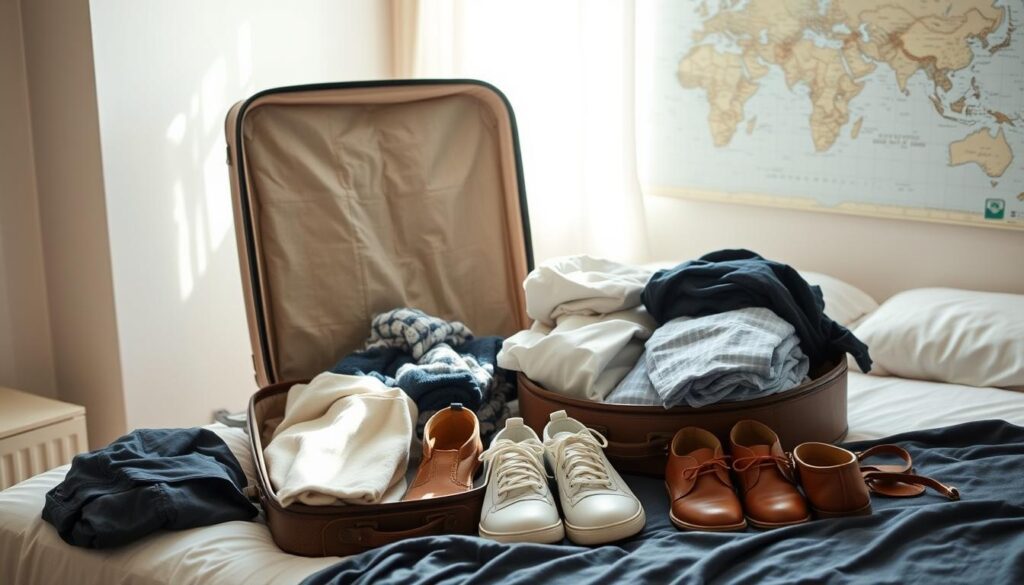
Work and Volunteer While Traveling
Discover how to fund your travels by working remotely or volunteering. These options can help you save money or experience a deeper cultural connection. They make your journey more meaningful and affordable.
Remote Work Opportunities
Remote work has opened doors for travelers. You can write, design websites, or even tutor online. The gig economy offers many jobs, letting you earn while you explore. Some companies even have jobs for digital nomads, allowing you to work from anywhere.
Volunteering and Cultural Exchanges
Volunteering or participating in cultural exchanges can be incredibly rewarding. You’ll help with important projects and connect with local communities. You can teach English or help with conservation, gaining valuable insights. Many programs offer free housing, making your trip cheaper.
Working remotely or volunteering can fund your travels and enrich your experience. With creativity and a sense of adventure, you can see the world without spending a lot.
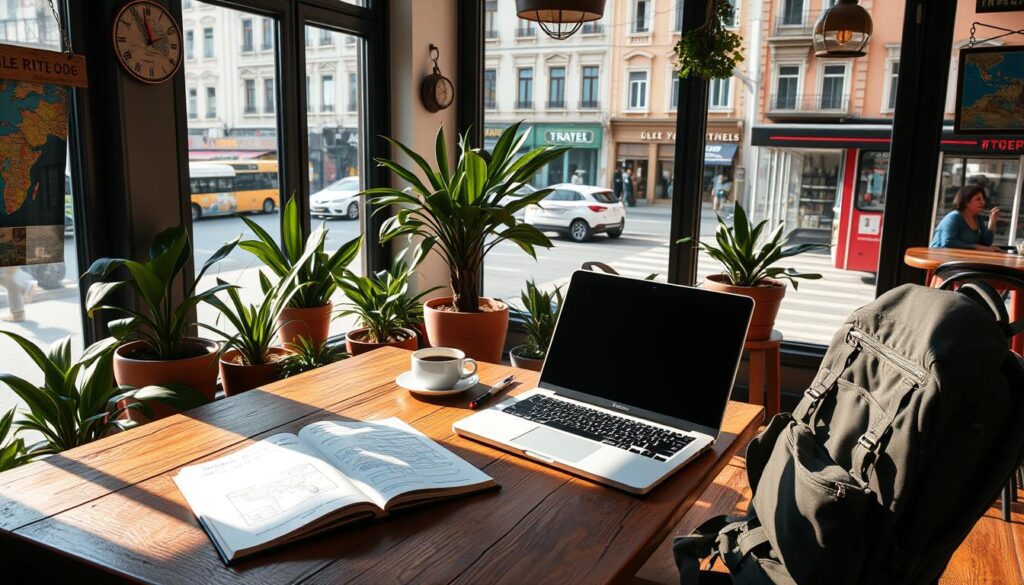
Embrace a Minimalist Mindset
Starting your budget travel journey with a minimalist mindset can change everything. Focus on experiences, not stuff, to save money and enjoy your travels more.
Minimalist travel means packing light and choosing what’s truly important. It lets you travel without the weight of too much stuff. Plus, it helps you stay present and enjoy your surroundings more.
- Choose clothes and accessories that can be used in many ways.
- Don’t buy things on impulse or keep souvenirs that cost too much.
- Get to know the local culture by experiencing it firsthand, not just buying souvenirs.
Being minimalist saves you money and makes your travels more meaningful. You’ll spend less time buying things and more time exploring, meeting people, and making memories.
“Simplicity is the ultimate sophistication.”
– Leonardo da Vinci
The real value of minimalist travel is in the experiences you have, not the things you own. Embrace this idea, and you’ll find endless budget travel options that will make your journey richer and your wallet happier.
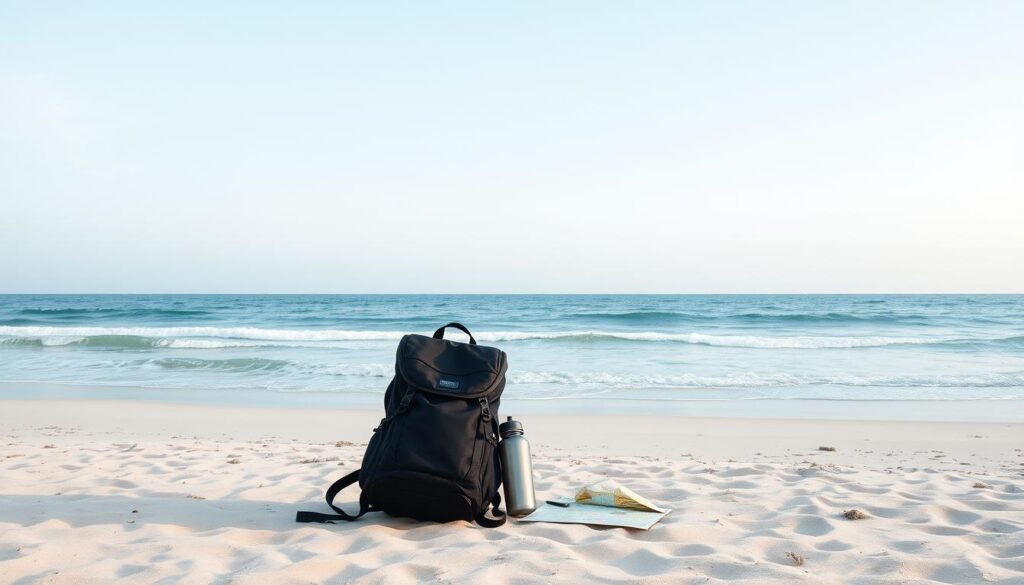
Utilize Travel Apps and Resources
In today’s world, travel apps and online resources are key for those on a budget. They help find cheap places to stay, affordable ways to get around, and low-cost activities. These tools can make your travel money go further.
Skyscanner is a top app for budget travelers. It lets you compare prices for flights, hotels, and car rentals. Airbnb is also great, connecting you with local hosts for unique and often cheaper stays.
- Use Hopper and Kayak to track flight prices and get alerts on the best booking times
- Check out Couchsurfing and Workaway for free or cheap places to stay and cultural experiences
- Download Google Translate and Maps to easily explore new places
There are also many online resources to help save money on travel. Sites like Scott’s Cheap Flights and The Flight Deal find amazing flight deals. TripAdvisor and Lonely Planet offer tips on cheap activities and local experiences.
| App | Description | Typical Savings |
|---|---|---|
| Skyscanner | Compares flight, hotel, and car rental prices across multiple providers | Up to 50% on flights and 30% on hotels |
| Airbnb | Offers unique and often more affordable alternative accommodations | 20-50% savings compared to traditional hotels |
| Hopper | Tracks flight prices and provides recommendations on the best time to book | Potential savings of $50-$200 per flight |
Using travel apps and online resources can lead to many budget-friendly options. This way, you can enjoy your travels more, whether it’s a local trip or a big adventure abroad.
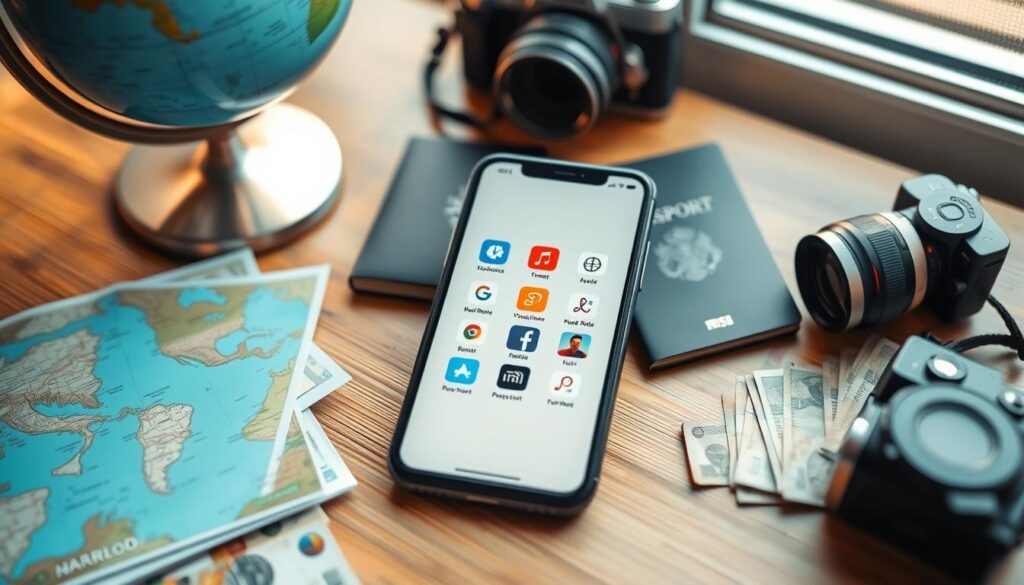
“The real voyage of discovery consists not in seeking new landscapes, but in having new eyes.” – Marcel Proust
Conclusion
By using the money-saving tips from this article, you can travel the world on a tight budget. You can make your dream trip happen. Start by choosing the right place to stay and using local transport.
Look for free or cheap activities and eat like a local. These steps help you stretch your travel budget. You’ll see how to get more value for your money.
Use travel rewards, plan smart, and travel light to save big. You can plan a $500 trip to Europe or a $1,000 trip to Southeast Asia. Make the most of your travel budget.
Follow these tips to travel without spending too much. So, start planning your next budget-friendly trip. Make your travel dreams come true.
